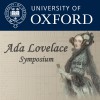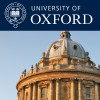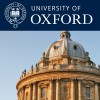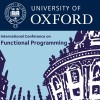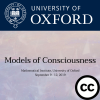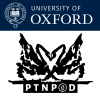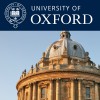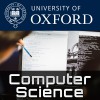Department of Computer Science

Relevant Links
The Department of Computer Science, University of Oxford, is consistently recognised as the internationally leading centre of research and teaching across a broad spectrum of computer science, ranging from foundational discoveries to interdisciplinary work with significant real-world impact.
The department is proud of its history as one of the longest-established computer science departments in the country, as it continues to provide first-rate undergraduate and postgraduate teaching to some of the world's brightest minds. It enjoys close links with other University departments and Oxford research groups and institutes.
Series associated with Department of Computer Science
| # | Episode Title | Description | People | Date | |
|---|---|---|---|---|---|
| 58 | Creative Commons | Persistence for the Masses: RRB-Vectors in a Systems Language | Juan Pedro Bolívar Puente, Independent Consultant, Sinusoidal Engineering, Germany, gives the first talk in the first panel, Low-level and Systems Programming, on the 2nd day of the ICFP conference. | Juan Pedro Bolívar Puente | 18 Dec 2017 |
| 57 | Creative Commons | Assuring AI | John Launchbury, Chief Scientist of Galois Inc, gives the second keynote of the ICFP conference. | John Launchbury | 18 Dec 2017 |
| 56 | Creative Commons | Effect-Driven QuickChecking of Compilers | Jan Midtgaard, gives the fourth presentation in the fourth panel, Effects, in the ICFP 2017 conference. Co-written by Mathias Nygaard Justesen, Patrick Kasting, Flemming Nielson, Hanne Riis Nielson, DTU, Denmark. | Jan Midtgaard | 18 Dec 2017 |
| 55 | Creative Commons | Imperative Functional Programs that Explain their Work | Jan Stolarek, University of Edinburgh, UK, gives the third presentation in the fourth panel, Effects, in the ICFP 2017 conference. Co-written by Wilmer Ricciotti, Roly Perera and James Cheney, and University of Edinburgh, UK. | Jan Stolarek | 18 Dec 2017 |
| 54 | Creative Commons | On the Expressive Power of User-Defined Effects: Effect Handlers, Monadic Reflection, Delimited Control | Ohad Kammar, University of Oxford, UK, gives the second presentation in the fourth panel, Effects, in the ICFP 2017 conference. | Ohad Kammar | 13 Dec 2017 |
| 53 | Creative Commons | Abstracting Definitional Interpreters | David Darais, University of Maryland, USA, gives the first presentation in the fourth panel, Effects, in the ICFP 2017 conference. Co-written by Nicholas Labich, David Van Horn, Phuc C. Nguyen, University of Maryland, USA. | David Darais | 13 Dec 2017 |
| 52 | Creative Commons | Symbolic Conditioning of Arrays in Probabilistic Programs | Praveen Narayanan, Indiana University, USA, gives the third presentation in the third panel, Applications, in the ICFP 2017 conference. Co-written by Chung-Chief Shan, Indiana University, USA. | Praveen Narayanan | 13 Dec 2017 |
| 51 | Creative Commons | A Framework for Adaptive Differential Privacy | Daniel Winograd-Cort University of Pennsylvania, USA, gives the first presentation in the third panel, Applications, in the ICFP 2017 conference. Co-written by Andreas Haeberlen and Aaron Roth, University of Pennsylvania, USA. | Daniel Winograd-Cort | 13 Dec 2017 |
| 50 | Strachey Lecture: The Continuing Evolution of C++ | Stroustrup discusses the development and evolution of the C++, one of the most widely used programming languages ever. | Bjarne Stroustrup | 12 Dec 2017 | |
| 49 | Creative Commons | Prototyping a Query Compiler using Coq (Experience Report) | Louis Mandel (IBM) gives the first presentation in the third panel, Applications, in the ICFP 2017 conference. Co-written by Joshua Auerbach, Martin Hirzel, Avraham Shinnar, Jerome Simeon, IBM Research, USA. | Louis Mandel | 12 Dec 2017 |
| 48 | Creative Commons | A Unified Approach to Solving Seven Programming Problems (Functional Pearl) | William E. Byrd, University of Utah, USA, gives the fourth presentation in the second panel, Functional Programming Techniques, in the ICFP 2017 conference. | William E Byrd | 12 Dec 2017 |
| 47 | Creative Commons | Generic Functional Parallel Algorithms: Scan and FFT | Conal Elliott, Target, USA United States, gives the third presentation in the second panel, Functional Programming Techniques, in the ICFP 2017 conference. | Conal Elliott | 12 Dec 2017 |
| 46 | Creative Commons | A Pretty But Not Greedy Printer (Functional Pearl) | Jean-Philippe Bernardy, University of Gothenburg, gives the second presentation in the second panel, Functional Programming Techniques, in the ICFP 2017 conference. | Jean-Philippe Bernardy | 12 Dec 2017 |
| 45 | Creative Commons | Faster Coroutine Pipelines | Mike Spivey, University of Oxford, UK, gives the first presentation in the second panel, Functional Programming Techniques, in the ICFP 2017 conference. | Mike Spivey | 12 Dec 2017 |
| 44 | Creative Commons | Scaling up Functional Programming Education: Under the Hood of the OCaml MOOC | Roberto Di Cosmo (Inria, France and University of Paris Diderot, France), gives the fourth presentation in the first panel, Art and Education, in the ICFP 2017 conference. | Roberto Di Cosmo | 12 Dec 2017 |
| 43 | Creative Commons | Lock-Step Simulation Is Child's Play (Experience Report) | Joachim Breiner, University of Pennsylvania, United States, gives the third presentation in the first panel, Art and Education, in the ICFP 2017 conference. Co-written by Chris Smith Google, USA. | Joachim Breiner | 12 Dec 2017 |
| 42 | Creative Commons | Testing and Debugging Functional Reactive Programming | Ivan Perez, University of Nottingham, UK, gives the second presentation in the first panel, Art and Education, in the ICFP 2017 conference. Co-written by Henrik Nilsson, University of Nottingham, UK. | Ivan Perez | 12 Dec 2017 |
| 41 | Creative Commons | Super 8 Languages for Making Movies (Functional Pearl) | Leif Andersen (Northeastern University, USA) gives the first presentation in the first panel, Art and Education, in the ICFP 2017 conference. | Leif Andersen | 07 Dec 2017 |
| 40 | Creative Commons | Compositional Creativity: Some Principles for Talking to Computers | Chris Martens (North Carolina State University, United States) gives the first talk in the ICFP conference. | Chris Martens | 05 Dec 2017 |
| 39 | Creative Commons | Chaperone Contracts for Higher-Order Sessions | Hernan Melgratti (University of Buenos Aires, Argentina), gives the first talk in the third panel, Contracts and Sessions, on the 3rd day of the ICFP conference. | Hernan Melgratti | 14 Sep 2017 |
| 38 | Lovelace Lecture: Learning and Efficiency of Outcomes in Games | Éva Tardos, Department of Computer Science, Cornell University, gives the 2017 Ada Lovelace Lecture on 6th June 2017. | Éva Tardos, Leslie Goldberg | 22 Aug 2017 | |
| 37 | What are types for? | Types in programming languages are commonly thought of as a way of preventing certain bad things from happening, such as multiplying a number by a string. | Jeremy Gibbons | 26 Jun 2017 | |
| 36 | Parametric Polymorphism and models of storage | In this presentation, Uday brings together two strands of Christopher Strachey’s thought: parametric polymorphism and abstract models of storage. | Uday Reddy | 26 Jun 2017 | |
| 35 | Probabilistic Programming | Hongseok begins by talking about a program of Strachey’s that wrote “love letters” using the Manchester University computer. He then uses this as a lead in for discussing probabilistic methods of generating algorithms and programs. | Hongseok Yang | 26 Jun 2017 | |
| 34 | Christopher Strachey, First-Class Citizen | Philip reviews Christopher Strachey’s influence on modern-day functional programming languages. | Philip Wadler | 26 Jun 2017 | |
| 33 | A modelling language approach to defining mathematical structures via semantics | In this talk, Jane presents about her work on modelling dynamic behaviour of systems using quantative modelling techniques. Particular kinds of modelling diagrams are used and a mathematical approach to looking at their meaning is presented. | Jane Hillston | 26 Jun 2017 | |
| 32 | Greetings to the participants at “Strachey 100” | The logician Dana Scott played a crucial part in the story of denotational semantics, working for a term with Christopher Strachey in Autumn 1969, when he created a mathematical model for the foundation of the method. | Dana Scott | 26 Jun 2017 | |
| 31 | Strachey: school master, language designer, colleague | In this panel discussion, three people who knew Christopher Strachey in different contexts talk about their memories of him. | Roger Penrose, Michael Jackson, David Hartley | 26 Jun 2017 | |
| 30 | Semantic relationships: reducing the separation between practice and theory | Christopher Strachey believed that the gap between theory and practice was impeding the development of computing science. | Robert Milne | 26 Jun 2017 | |
| 29 | SIS, a semantics implementation system | During Peter’s DPhil studies, supervised by Christopher Strachey, he developed a prototype of a system for executing programs based on their denotational semantics. | Peter Mosses | 26 Jun 2017 | |
| 28 | Strachey and the development of CPL | Chrisopher Strachey was the most significant contributor to the design and implementation of the programming language CPL. | Martin Richards | 26 Jun 2017 | |
| 27 | Strachey and the Oxford Programming Research Group | Christopher Strachey’s right-hand man at Oxford talks about Strachey’s time as the head of the Programming Research Group (PRG). | Joe Stoy | 26 Jun 2017 | |
| 26 | Strachey: the Bloomsbury Years | A historian’s perspective on the earlier years of Christopher Strachey’s life. The talk covers his familial connections, his early career as a school master, and his first computing projects. | Martin Campbell-Kelly | 26 Jun 2017 | |
| 25 | Strachey Lecture: Computer Agents that Interact Proficiently with People | Professor Kraus will show how combining machine learning techniques for human modelling, human behavioural models, formal decision-making and game theory approaches enables agents to interact well with people. | Sarit Kraus | 23 Jun 2017 | |
| 24 | Strachey Lecture: Probabilistic machine learning: foundations and frontiers | Professor Zoubin Ghahramani gives a talk on probabilistic modelling from it's foundations to current areas of research at the frontiers of machine learning. | Zoubin Ghahramani | 15 Mar 2017 | |
| 23 | Oxford University Department of Computer Science: Second Year Group Design Practicals | Students undertaking undergraduate (first) degrees in Computer Science, Computer Science & Philosophy and Maths & Computer Science undertake a Group Design Practical as a compulsory part of the course. | Computer Science Students | 08 Nov 2016 | |
| 22 | Strachey Lecture: The Once and Future Turing | Professor Andrew Hodges author of 'Alan Turing: The Enigma' talks about Turing's work and ideas from the definition of computability, the universal machine to the prospect of Artificial Intelligence. | Andrew Hodges | 02 Nov 2016 | |
| 21 | Creative Commons | Strachey Lecture: Quantum Supremacy | Dr Scott Aaronson (MIT, UT Austin) gives the 2016 Strachey lecture. | Scott Aaronson | 14 Jun 2016 |
| 20 | Strachey Lecture: Artificial Intelligence and the Future | In this talk Demis Hassabis discuss's what is happening at the cutting edge of AI research, its future impact on fields such as science and healthcare, and how developing AI may help us better understand the human mind. | Demis Hassabis | 26 Feb 2016 | |
| 19 | Creative Commons | Enchantress of Abstraction, Bride of Science: must Ada Lovelace be a superheroine? | Panel discussion to conclude the symposium with Muffy Calder, Valerie Barr, Suw Charman-Anderson, Murray Pittock and Cheryl Praeger. | Muffy Calder, Valerie Barr, Suw Charman-Anderson, Murray Pittock | 18 Dec 2015 |
| 18 | Creative Commons | Humans, machines, and the future of work | Moshe Vardi, Rice University explores the question "If machines are capable of doing almost any work humans can do, what will humans do?". | Moshe Vardi | 18 Dec 2015 |
| 17 | Creative Commons | Mathematics and culture: geometry and its ‘Figures in the Air’ | Judith Grabiner, Pitzer College describes how the 19th century saw radical change, producing new ideas of space, destroying the unchallenging authority of mathematics, revolutionising art, making relativity possible and helping create modernism. | Judith Grabiner | 18 Dec 2015 |
| 16 | Creative Commons | Imaginary engines | In this talk graphic artist and animator Sydney Padua talks about her bestselling graphic novel "The Thrilling Adventures of Lovelace and Babbage". She will also display her 3D animations of how the Analytical Engine would have looked and operated. | Sydney Padua | 18 Dec 2015 |
| 15 | Creative Commons | The Analytical Engine and the Aeolian Harp | In this talk Imogen Forbes-Macphail, University of California, Berkeley, contextualises Lovelace's work on the engines against the backdrop of Romantic thought surrounding the power of poetry and the nature of original composition. | Imogen Forbes-Macphail | 18 Dec 2015 |
| 14 | Creative Commons | Enchantress of Numbers or a mere debugger?: a brief history of cultural and academic understandings of Ada Lovelace | To mark the 200th anniversary of Lovelace's birth, Elizabeth Bruton, Museum of the History of Science, reviews and explores academic and popular representations of Ada Lovelace and engage with the controversy of her claim as the first computer programmer. | Elizabeth Bruton, Sally Shuttleworth | 18 Dec 2015 |
| 13 | Creative Commons | The mathematical correspondence of Ada Lovelace and Augustus De Morgan | During the years 1840-1, Ada Lovelace corresponded with the mathematician Augustus De Morgan. In this talk Christopher Hollings, University of Oxford reports on recent new studies of the mathematics Ada was learning with De Morgan. | Christopher Hollings | 18 Dec 2015 |
| 12 | Creative Commons | The early education of Ada Byron | In this talk Julia Markus, Hofstra University shall dispel the myth that Lady Byron kept Ada from poetry, she will also show that the mother-daughter relationship was a psychological spur to Ada's early experiments. | Julia Markus | 18 Dec 2015 |
| 11 | Creative Commons | Pythagoras to pacifism: mathematics and archives | In this talk June Barrow-Green from the Open University describes some mathematical archives and some of the issues associated with them. Includes an introduction from Vicki Hanson, Vice-President of the ACM. | June Barrow-Green, Vicki Hanson | 18 Dec 2015 |
| 10 | Creative Commons | Will you concede me Poetical Science? | Ada Lovelace had a broad interest in the science and technologies of the day and explored post-Romantic ideas which made a significant link between science and poetry. In this talk Richard Holmes looks at some of these surprising connections. | Richard Holmes | 18 Dec 2015 |
| 9 | Creative Commons | Ada Lovelace lives forever: Ada’s four questions | How Ada approached information is the key to understanding her contribution. In this talk Betty Toole, author of "ADA: The Enchantress of Numbers" focuses on Ada's four questions: What is the source? What does it mean? What if? and Why not? | Betty Toole | 18 Dec 2015 |
| 8 | Creative Commons | From Byron to the Ada Programming Language | John Barnes, Ada software consultant talks about Byron and his bear and the evolution of the computing language named after Ada Lovelace. | John Barnes | 17 Dec 2015 |
| 7 | Creative Commons | Turning numbers into notes | Composer Emily Howard talks to David De Roure about her musical composition 'Ada sketches'. | Emily Howard, David De Roure | 17 Dec 2015 |
| 6 | Creative Commons | Ada Lovelace, a scientist in the archives | Ursula Martin, University of Oxford and Soren Riis, Queen Mary University of London give new focus to letters within the archive of Ada Lovelace's family documents. Includes an introduction by Nick Woodhouse, President of the Clay Mathematics Institute. | Soren Riis, Ursula Martin, Nick Woodhouse | 17 Dec 2015 |
| 5 | Creative Commons | Notions and notations: designing computers before computing | Adrian Johnstone, Royal Holloway, University of London reviews Babbage's remarkable 'Mechanical Notation'. | Adrian Johnstone | 17 Dec 2015 |
| 4 | Creative Commons | Interpreting dreams of abstract machines | Bernard Sufrin, University of Oxford establishes a context of Ada's 'Translators Notes' using more recent descriptions of computing machinery and programming methods. | Bernard Sufrin | 17 Dec 2015 |
| 3 | Charles Babbage and Ada Lovelace: two visions of computing | Doron Swade, Royal Holloway, University of London reviews the trajectory of Babbage's calculating Engines and examines Ada Lovelace's contribution to computing. | Doron Swade | 17 Dec 2015 | |
| 2 | Creative Commons | Introduction to the Ada Lovelace Symposium | Alexander Wolf, President of the Association for Computing Machinery and Imperial College London, introduces the Ada Lovelace Symposium. | Alexander Wolf | 14 Dec 2015 |
| 1 | Creative Commons | Strachey Lecture: Bidirectional Computation is Effectful | A reconstruction (slides and voiceover) of a talk given at the Summit on Advances in Programming Languages (snapl.org/2015) in May 2015. | Jeremy Gibbons | 17 Nov 2015 |
- ‹ previous
- 2 of 2

